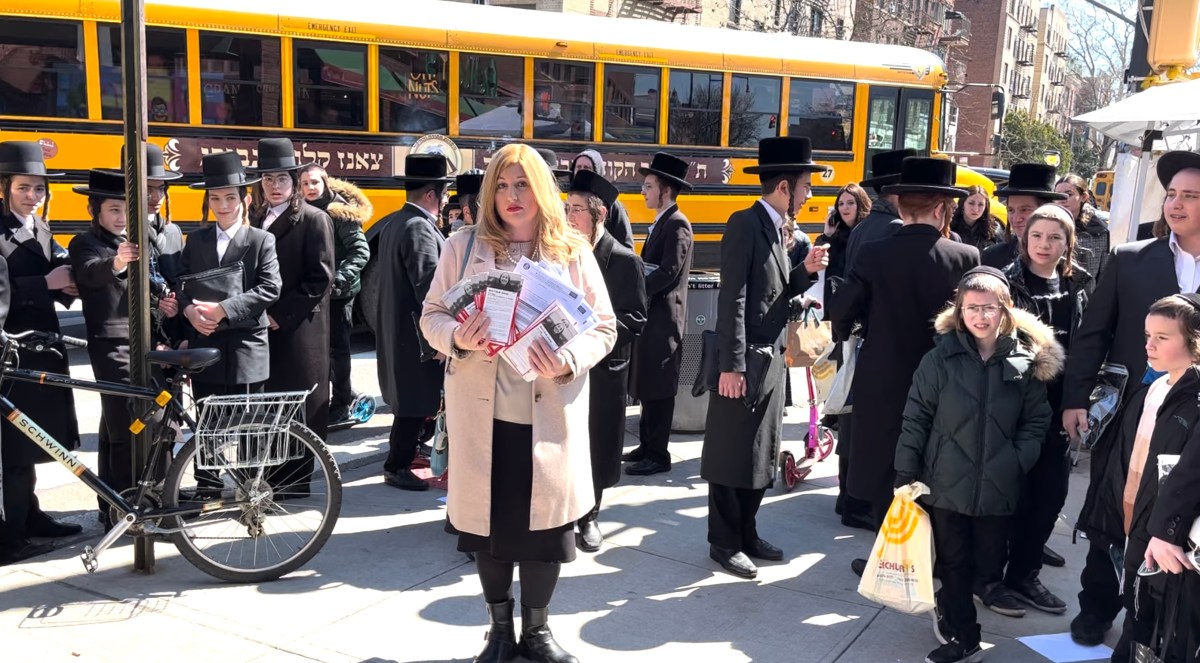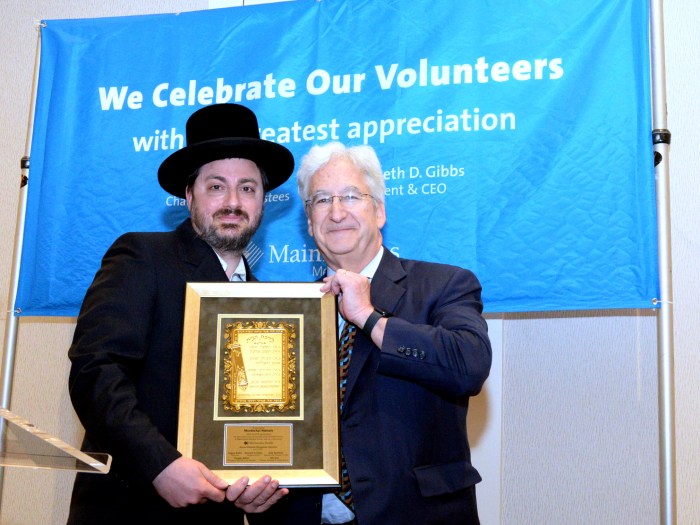A push to educate Orthodox Jewish women about their rights in marriage and divorce turned sour in Borough Park on March 29, when a group of women were attacked and their materials destroyed by a large group of men and boys.
The organizers of the event — former city council candidate Amber Adler and local activist Adina Sash – wanted to teach women how to “safeguard their futures,” Adler said — how to protect themselves from becoming an agunah, or a “chained woman.”
In Orthodox Judaism, for a couple to divorce, the husband has to obtain and sign a document called a “get” from a rabbinical court and deliver it to his wife. A woman cannot obtain a get on her own.
But some men refuse to sign a get, sometimes for years, leaving their wives “chained,” Adler said. Some women end up tethered to abusive partners, and all are unable to remarry without a get.
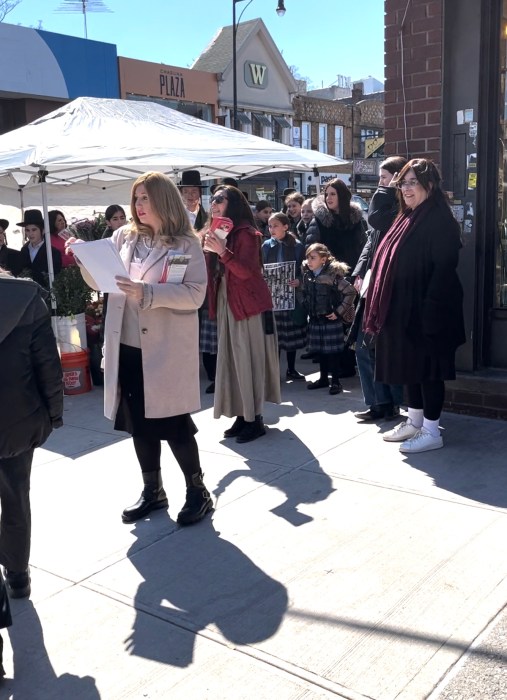
“This particular topic is very personal to me because I spent over two years as an agunah, and it was a very painful period in my life,” Adler told Brooklyn Paper.
Rallies to support agunot — women unable to obtain a rabbinic divorce — and pressure their husbands are not uncommon. Sash is leading a campaign in support of Malky Berkowitz, a woman living in Kiryas Joel whose husband has allegedly refused her a get for more than two years.
At their March 29 pop-up, Adler and Sash wanted to take a new approach. They planned to distribute information about the legal rights women have in marriage and divorce, and hand out copies of halachic (Jewish law) pre- and post-nuptial agreements, which can prevent a husband from refusing his wife a get.
With a few other women, the two set up a table and tent outside a Judaica store in Borough Park. Their timing and location were intentional — they knew people would be out and about on a Friday afternoon, preparing for Shabbos.
The first few hours went smoothly. Women — both married and unmarried — wanted to learn more. So did some fathers of daughters, Adler said.
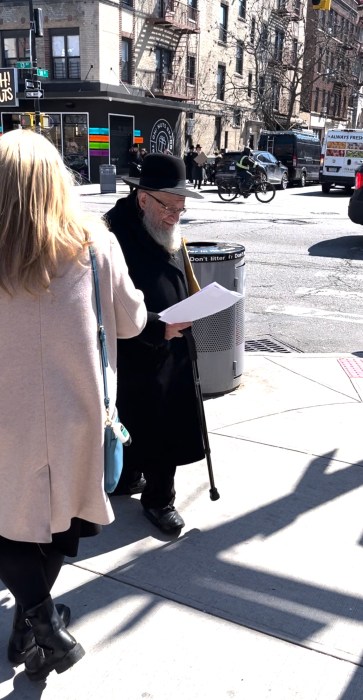
“A lot of women were very eager to learn about it, to learn about the prenup, to learn about the postnup, they had never even heard of it,” Sash said. “The more a community struggles with gender division and gender discrimination, the more resistance there is to the halachic pre-nup.”
Technically, Adler said, a get shouldn’t be hard to obtain.
“The problem begins when a husband wants to use the get as leverage,” she said.
Some men refuse to sign until their wives agree to the custody agreement they want, or demand that their wives pay a large sum of money. Adler said one woman in southern Brooklyn recently paid “hundreds of thousands of dollars” to receive her get. Some women, unable to pay, wind up as agunot for decades.
The agunot crisis isn’t widely discussed, Adler said — even now, as advocates like Sash spread the word online, it’s hard for women to get help. When Adler was fighting for her get, she spoke with dozens of people and many different rabbis, she said, before finding an international group that could help her.
“What I learned was every case, every situation is completely different. Different men respond to different requests, and there is no standard one-two-three about how to go about something like this,” she said.
Along with the pre- and post-nuptial agreements, the women handed out information about Berkowitz, encouraging those who took the information to pray for her as they lit their Shabbos candles.
Around midday, the mood shifted, Adler and Sash said. A crowd gathered around them, and things went south quickly. A group of teens and tweens started verbally harassing the women and tried to tear the tent down.
Some loudly criticized agunot, Adler said – saying that Berkowitz deserved to suffer, and asking “how dare we speak to men.”
Then, someone threw an egg.
Under constant threat
“The first egg … broke the barrier,” Sash said. “The young boys who were just looking as spectators realized this might be an opportunity to have some fun and let out some of their steam.”
The crowd — numbering, by their estimation, 100-150 people — started throwing eggs, rocks, and pizza slices at them and throwing their papers to the ground. When the women bent to try to pick up the papers, some people threw small firecrackers at them, then started trying to set the papers on fire.

That was when they realized they had to leave. Some men followed them down the street, forcing the women to split up to try to disperse the crowd. Eventually, the police arrived to break it up.
“For me, the hardest part of this was watching and listening to young boys say the most hateful things about not just [Berkowitz], but women in general,” Adler said. “It was very painful for me to hear those things, because I can’t imagine adults, let alone teens or tweens, have these kind of thought processes.”
Sash said she’s used to angry, sometimes violent reactions to her events. The activist dresses, acts, and speaks in a deliberately provocative way, she explained, to bring that “toxicity” to the surface.
“The rage from the men and the boys is really what is at the heart of the crisis, so if you can’t expose that quickly, then you’re tacking and problem-solving around the wrong parts,” she said. “[Women] need to understand that it’s not just a couple of crazy recalcitrant husbands who are not giving get. It’s not just a couple of corrupt rabbinical courthouses who enable get withholding. It’s endemic to the entire way that boys are raised in the yeshiva system.”
Neither woman was dissuaded by the incident, but Sash said she’s finding it more and more difficult to be optimistic. She has a long list of women waiting for her help, she said, and feels they are running out of time to solve the agunah crisis as she watches the women and girls in the community struggle.
But as she fights, she receives constant criticism and threats from the husbands of agunah she is supporting — and is also criticized by women who don’t agree with her ideas. Facing a long, hard road, Sash said people often ask her why she doesn’t just stop the work, or leave the faith.
“I should abandon women that I consider my Jewish sisters? I should turn a blind eye and harden my heart and make myself cold to the suffering of women who can’t speak out, who are trapped in their family units, who cannot escape? Whose parents or husbands or communities would reject and excommunicate them if they did even one-hundredth of what I did, or said one-hundredth of what I said? I can’t do that,” she said. “I can’t abandon Jewish women in that way.”
Adler said that freeing individual agunah, like Berkowitz, is a long and labor-intensive process. The only way to end the crisis, she said, is to prevent women from becoming agunah at all.
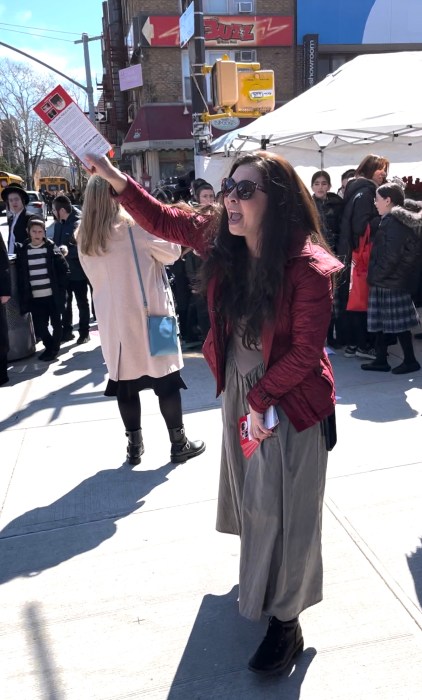
In addition to working to educate women on their options, Adler is advocating for their legal rights. One bill sponsored by Queens Assembly Member Andrew Hevesi would make coercive control of a spouse a felony, and Adler said legislators are discussing a new bill that would support Orthodox women in family court.
While her approach has been on helping individual agunah get free as quickly as possible and implementing legal remedies, Adler said the response to the event on March 29 made her realize they must also educate the young people in the community.
“I think the thing that worries me the most is these teenage boys start from the point we saw them on Friday, then where will they be a few years from now when they’re entering their marriage?” she said. “This is only going to perpetuate the cycle if people don’t change their viewpoints and their understanding.”
Sash, meanwhile, is focused on transforming rabbinical courts. There are old religious texts, she said, that say a marriage can be dissolved without a get — but many courts refuse to abide by them.
But a rabbinical court unwilling to free an agunah is akin to an emergency room without an Epi-Pen, she said.
Some courts — like the International Beit Din — already work to free agunot under Jewish law. Similarly, The Organization for the Resolution of Agunot guides women through divorce and works to stop abuse related to get withholding.
“I think it’s very fascinating, and this really is, in my opinion, a women’s rights revolution happening right here in the heart of Brooklyn,” she said. “People are starting to wake up, but the counterreaction is … making it a little harder.”


